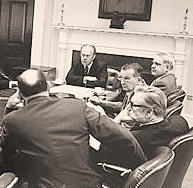 An article (paid subscription required) in this week’s Washington Tariff & Trade Letter reports that at the Defense Trade Advisory Group (“DTAG”) meeting held on April 7, Frank Ruggiero, the Deputy Assistant Secretary of the Directorate of Defense Trade Controls (“DDTC”) announced that the agency had asked the National Security Council to review the treatment of foreign nationals under U.S. export laws. The DDTC request was sent at the end of March, but there is no current timetable for its consideration by the NSC inasmuch as the Obama administration is still putting together and organizing the new NSC.
An article (paid subscription required) in this week’s Washington Tariff & Trade Letter reports that at the Defense Trade Advisory Group (“DTAG”) meeting held on April 7, Frank Ruggiero, the Deputy Assistant Secretary of the Directorate of Defense Trade Controls (“DDTC”) announced that the agency had asked the National Security Council to review the treatment of foreign nationals under U.S. export laws. The DDTC request was sent at the end of March, but there is no current timetable for its consideration by the NSC inasmuch as the Obama administration is still putting together and organizing the new NSC.
At issue is the difference between the way the Bureau of Industry and Security (“BIS”) and DDTC treat foreign nationals with respect to approving transfer of controlled technical data to them. For example, DDTC may use the country of birth of a foreign national to deny licenses or agreements involving transfer of technical data to that individual. BIS, on the other hand, considers the individual’s current citizenship in evaluating his or her ability to receive controlled technical data regarding dual use items.
DDTC’s policy of considering country of birth has created some concern within the export community because it has been applied inconsistently and without any clear statement of applicable guidelines. In some formulations, it appears that the DDTC would automatically apply the policy to bar access to technical data by persons born in, but not citizens of, countries subject to arms embargos under section 126.1 of the International Traffic in Arms Regulations. At other times, DDTC has suggested that a case-by-case consideration would be applicable to foreign nationals born in proscribed countries, an approach that makes more sense when you consider situations such as a child of French diplomats born in China.
The policy has also drawn criticism from abroad. Human rights commissions in Canada and Australia have pointed out that the DDTC’s policy is, in effect, an illegal discrimination based on national origin. This has put U.S. contractors doing business in those countries in a difficult position since it is impossible for them to comply both with DDTC requirements and local laws.
Although a review of these issues for the purposes of achieving uniformity is laudable, DDTC’s motive in requesting that review is somewhat hard to determine. On the one hand, perhaps DDTC is looking for administrative cover to back away from its stricter rule and provide some relief from U.S. defense contractors with overseas operations. On the other hand, DDTC might simply be seeking to have its own narrower view imposed on BIS and other export agencies.
 Permalink
Permalink
Copyright © 2009 Clif Burns. All Rights Reserved.
(No republication, syndication or use permitted without my consent.)

 Posted by
Posted by  Category:
Category: 

